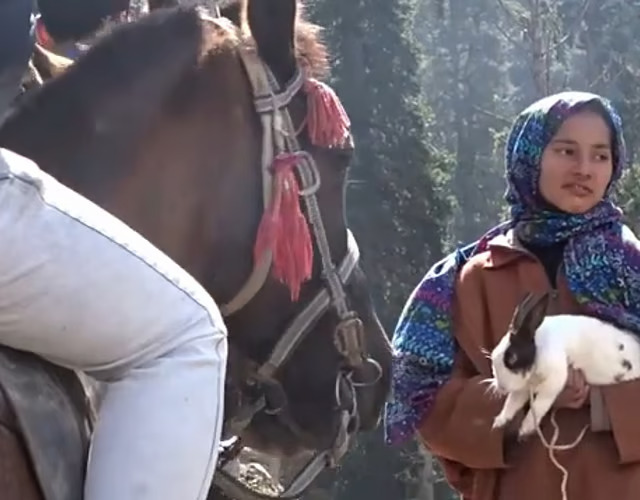How Kashmir’s 16-YO ‘Rabbit Girl’ Turned Her Home Into a Shelter After the Pahalgam Attack
As gunshots shattered the serene afternoon air in the lush meadows of Baisaran on Tuesday, five kilometres from Pahalgam hill town, panic gripped the visitors.
But in that moment of terror, a teenager from a nearby Gujjar settlement rose above the fear, becoming an unlikely heroine in the face of horror.
Rubeena, 16, known as the ‘Rabbit Girl of Kashmir’ for offering her pet bunny to tourists for a few rupees per photo, found herself at the heart of an unfolding tragedy. The young girl, who now works as a guide and helper in the Baisaran Eco Park, had accompanied a couple from Chennai just moments before the attack began.
“We reached the park around 2.00 PM,” Rubeena recalled.
“They made Maggie noodles, clicked some pictures, and suddenly—gunshots. At first, we thought they were firecrackers. Then we saw the chaos. People running, screaming. Pony-wallas shouting, ‘Run away!’”
That moment marked the beginning of one of the darkest days Kashmir has witnessed in years. The gunmen opened fire on tourists, killing 26 people. At least 17 others were injured in the attack that has since shaken the Valley to its core.
Amid the mayhem, Rubeena ran for cover. But once she reached safety, her concern was not for herself.
“I kept going back to the park gate—three times—looking for the couple. Everything was so dark and confusing. Nobody knew what had happened. We were all numb.”
As exhausted and tearful tourists trickled down from the hills, many barefoot and trembling, Rubeena and her 17-year-old sister Mumtaza turned their modest home into a refuge. Their mud-thatched house, just a kilometre from the park, became an unlikely shelter.
“We gave them water. Tried to calm them,” said Mumtaza, who, despite a fractured foot, carried a tourist’s 10-year-old child to safety.
“I went back up the hill twice more. They were wailing—worried about their belongings, but mostly just shocked.”
Fearing the worst
Their father, Ghulam Ahmad Awan, had feared the worst when he heard the gunfire.
“I rushed out. Called my cousin and told him not to come near Baisaran. People were running barefoot, terrified. I didn’t know if my daughters were alive.”
When Mumtaza returned home limping, her father broke down in relief. “We thank God both of them came back safe. But it was like Doomsday. This should never have happened—barbaric, pure brutality.”
 Rubeena stands beside a tourist on horseback.
Rubeena stands beside a tourist on horseback.
Awan is ailing, and the family’s income rests solely on his daughters. Rubeena had to drop out of school to help support the family. After the COVID-19 lockdowns, she began working as a guide in the park, earning Rs 400 to Rs 500 a day.
“That money kept us afloat,” he said. “Now, our livelihood is gone.”
The tragedy struck just as Kashmir’s tourism industry was finding its feet again.
A record-breaking 12,000 tourists had arrived in the Valley in the first week of January 2025 alone, fuelling hopes for a brighter economic season. The attack has cast a long shadow on that optimism.
Tourism may not be Kashmir’s economic backbone, but it sustains countless families like Rubeena’s.
The region’s natural splendour—snow-capped peaks, emerald meadows, and crystal-clear rivers—has long drawn visitors from across India and the world. But now, fear has gripped the hills.
Rabbit Girl’s resilience
In the aftermath of Tuesday’s tragedy, Kashmiris have come together in grief. Silent protests, candlelight vigils, and complete shutdowns have swept across the Valley. In Pahalgam, hotels, pony operators, shopkeepers—all those connected to the tourism sector—have joined hands in mourning.
Public transport is halted. Schools have shut down. Social and religious groups have united to express solidarity with the bereaved families.
“This was not just an attack on tourists,” said a pony-walla, who participated in a silent march. “It was an attack on our hearts, on our homes, on our hope.”
For many, the image of Rubeena—the once-smiling ‘Rabbit Girl’ of Pahalgam—now represents the silent resilience of Kashmir’s youth. “She didn’t think twice before going back to help strangers,” said a local guide. “She is what Kashmir truly is—hospitable, warm, and unbreakable.”
Even as fear and uncertainty linger, Rubeena continues to sit quietly on her wooden cot, processing the trauma. Her rabbit is gone. Her routine was shattered. But her spirit, like the valley she calls home, endures.
And so does her hope. “I just want peace,” she said softly. “I want people to come back to these mountains. Not in fear—but with smiles.”
News